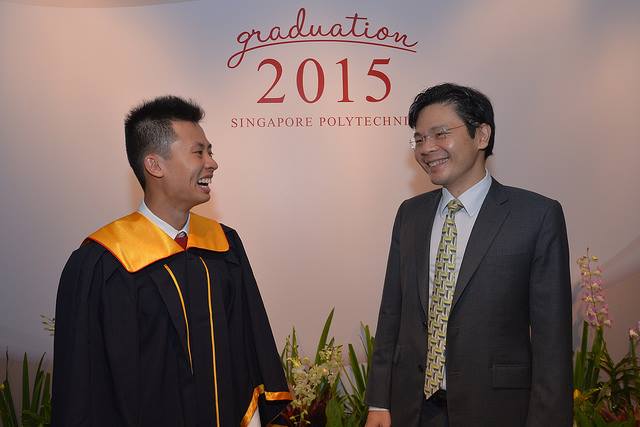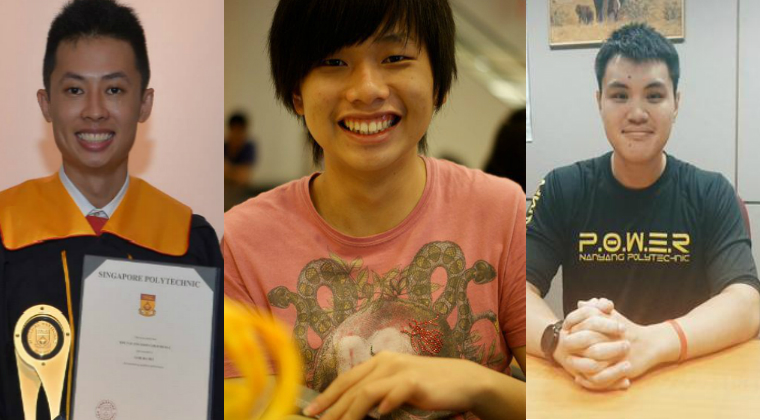Although the polytechnic graduation season has ended, the deluge of success stories lauding individuals transcending their circumstances are probably still fresh in your mind.
After all, who doesn’t like a flicker of hope?
Likewise, Mothership.sg has interviewed three high-performing polytechnic graduates, all hailing from the Institute of Technical Education (ITE), all securing slots in local universities.
The mainstream media would tout them as exemplars of a successful meritocracy system, but let’s change the ballgame a little.
Meet our first comeback kid, 21-year-old Goh Jia Hui from Singapore Polytechnic, every Public Relations (PR) personnel’s wet dream. He previously graced the pages of The New Paper, and even made it onto Minister Lawrence Wong's Facebook page (bravo Singapore Polytechnic PR!).
 Source: Lawrence Wong Facebook page
Source: Lawrence Wong Facebook page
When we first inquired about his life story, his immediate reply was, “don’t leh, too overused already.”
We soldiered on, and elicited more about his life and this is what we got:
1. He mingled with 'bad company' since primary school (in his words: they just didn't do legit things) and scored 101 points for his PSLE.
2. Continued his delinquency in secondary school, but was motivated to do well after being anointed appointed class monitor, crediting his secondary school teachers for his change. He also cited the National Cadet Corps as playing a part in directing him to the right path.
3. Entered ITE, attained a perfect 4.0 GPA, moved on to polytechnic and scored above 3.90.
4. Now, he plans to sign on, and has already applied for a Singapore Armed Forces (SAF) scholarship (paging any high-ranking SAF officials, are you reading Mothership?)
Next up is Lee Joon Lei, 21, who recently graduated from Republic Polytechnic’s (RP) Mass Communication (previously known as Communication and Information Design).
Here’s what we gleaned from his life story:
1. He retained once in secondary school.
2. He retook the GGE O-level privately while studying in Bishan ITE.
3. With his second set of O-level results, he studied in Republic Poly’s Mass Communication course, where he graduated with a diploma with merit. He plans to pursue Political Science in the Singapore Management University.
Our last interviewee is Chang Lek Yang Joey, 24, an Electrical Engineering with Eco-design diploma holder from Nanyang Polytechnic (NYP).
Like Goh Jia Hui, the man above was also interviewed by The New Paper, (surprise, surprise) with the sub headline of "He Studies Hard Despite Fatigue" section.
1. Joey was streamed into EM2 before dropping to EM3, and eventually scored 101 points for his PSLE.
2. His big turning point came in ITE when his lecturer spotted his talent.
3. With a perfect GPA in ITE, he earned a place in the Electrical Engineering with Eco-design course in NYP, took up three Co-Curricular Activities (CCAs), and graduated with a GPA of 3.96. He is looking to study at Nanyang Technological University, hopefully with a Singapore Power scholarship in tow.
Rather than myopically focusing on their success stories, we listen to their take on a myriad of issues, bringing more nuances to what mainstream media would fete as success stories.
As Lee Joon Lei said: “It’s not always a triumphant story of hard work.”
1. View on the education system
Jia Hui: "I think education is very important now, but not in the future. I see education as a stepping-stone to enter the workforce, but I know later on it will depend on character, performance and how you work with others."
Joon Lei: "I think an education is important, but an education and a degree, or more specifically, certification, are two different things. The problem is, people conflate the two.
Education should be seen as improving understanding, not social standing. Don’t you think that’s kind of perverted right there? Honestly I’ve never entered polytechnic thinking I’d be a high scorer, let alone go to a local university."
Joey (flanked by two PR personnels): "The education system here offers a variety of choices as to where you want to go in your life. You don't just have one choice. My sister was also from Normal Technical (NT), took private O-level, went to RP, and is going to the Singapore Management University. My friends who are o-level leavers, some go to MDIS. Yeah, it's very versatile here."
2. On being in ITE and/or NT.
Jia Hui: “I think don’t have to necessarily stream people into EM1, EM2, EM3 or NT. It makes people very demoralized.
In secondary 1, we were given a chance to go to Normal Academic, but only four from my class went, and it was the end of it; you get sad. No matter how well you study, you will still go to ITE, so you don’t study hard."
Likewise, Joey felt demoralised when he was in EM3, NT or ITE.
"Some external parties would say your son ah EM3, your son ah NT." He added that gossipmongers would say s*** that make him believe that he's lousy.
On the subject of streaming, he views such practice to be too premature in primary school, but necessary in secondary school.
"If you put me in express ah, confirm very jialat. In fact, I 'll feel even more demoralised. Normal Technical was not as in-depth as the Normal Academic nor the Express stream, but I could not even handle it."
It wasn’t always an endgame to everyone, like for Joon Lei’s case.
Joon Lei: “I’ve never let my results hang over my head so being in ITE did not affect me.
I do think that streaming is very bad, especially since they are so young. How can you cast people into various educational caste since young? Can you imagine what it does to their psyche?”
At least the EM3 label is no more.
3. On Poly life
Jia Hui: “The learning curve was very steep, but I was very fortunate to have teachers who were willing to help, especially if they know that we are from ITE.”
He also elaborated on the extensiveness of rote learning, citing that it was 70% theory.
He added that if he were to "go out and do the real life application", he would struggle.
"That’s very sad."
"Even for practicals it's nothing as compared to ITE, you do one time and you forget everything already... In ITE you do more, so you actually remember.”
Joon Lei: “This might sound pretentious, but they were the best years of my self-discovery. Wait, don’t put this on record!
Honestly, I didn’t feel like I was studying because I was interested in what I was reading. We were encouraged to peruse the Internet everyday, and not just being spoon-fed.
I don’t think I would have done better if I spent hours cramming content into my head.”
Joey had many CCAs to juggle, as he was involved in NYP's dragon boat, GEO Council and community service.
Despite his commitments, he made sure he went beyond practicing his tutorials by conducting research, trawling Youtube and Google, and even buying external sources.
On the subject of rote learning, Joey commented: "If you want to be in the engineering field, and you do that ah... rote learning is not good. One day this problem comes up, and another day another problem will spring up. The methods can be the same, the numbers different, but you have to know how to swap the different steps of the method around."
"The important thing is not to memorise, but to understand."
4. The importance of a degree.
Jia Hui: “I will definitely go to university. I have to la.
Although they announced that having a degree doesn’t matter, in reality it affects a lot.”
We, too, wonder who is ‘they’, but journalistic ethics prevent us from feeding words into our interviewees' mouth.
Joon Lei also echoed his sentiment, saying:“You see, nowadays the government says you don’t need a degree to get a good job, just learn some skills, but in truth companies still value a degree over a diploma.”
Ah this man said the g-word right there.
Unlike his comrades who paint the society as ascribing much value to a piece of certificate, Joey thinks "degree is important if you want to specialise in something. For my field,you need a degree; the things we deal with is very, very in-depth. Polytechnic is a bit in-depth, but it's still not enough. You need to go deeper."
---
This article was inspired by many things. Every May, we would see the same few stories, with different permutations of people. Some years it would be "Medical School Takes In Troubled Teenagers", another year it could be "Perseverance Pulled me Through".
These individuals are inspiring, but the onslaught of such stories inadvertently advances one definition of succeeding: to 'make it', is to excel in academics. To 'make it', you have to abandon past 'delinquencies' (whatever that means) and enter an established institution. As if you can't be 'troubled' and succeed in other ways all at once.
All these interviewees may come from the same point of departure, but not one draws the same conclusion. Some were 'delinquents', some were slow-learners, some were just uncomfortable jumping through hoops to pass a test like in secondary school. Some remained sanguine amidst setbacks, some reserved scathing remarks towards the system, while some become pragmatic.
You simply can't typecast everyone into the same "ITE to local university" narrative.
If you like what you read, follow us on Facebook and Twitter to get the latest updates.
If you like what you read, follow us on Facebook, Instagram, Twitter and Telegram to get the latest updates.





